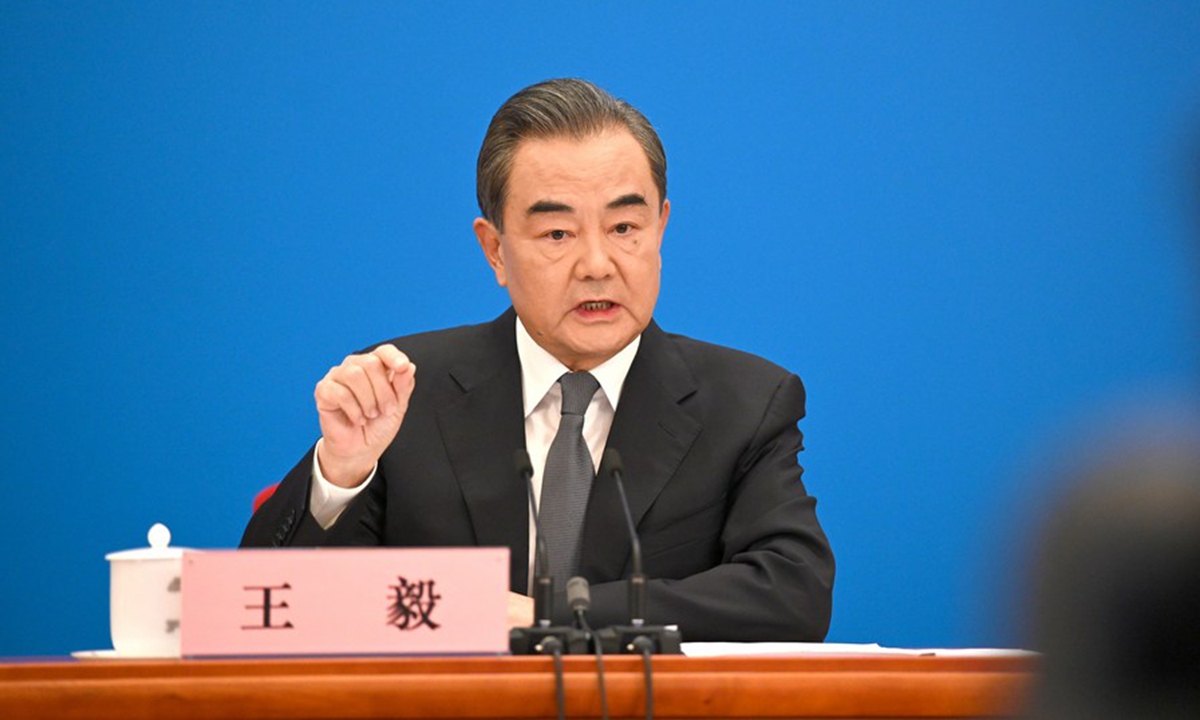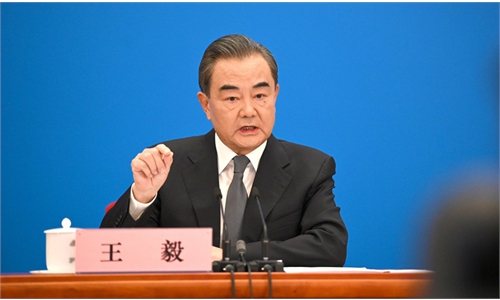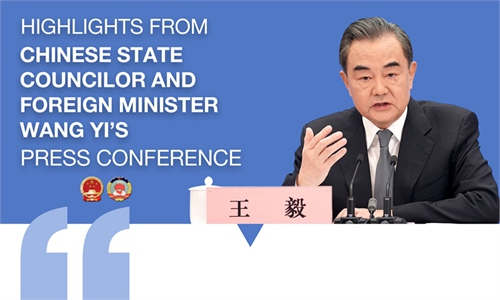
Chinese State Councilor and Foreign Minister Wang Yi. Photo: Xinhua
Summarizing Chinese diplomacy in 2020, State Councilor and Foreign Minister Wang Yi told reporters from around the world Sunday that China has firmly defended national interests over the past year. "We resolutely oppose hegemonic and bullying acts, and reject unreasonable interferences in China's internal affairs." Wang emphasized that China's sovereignty cannot be violated. He further said that the dignity of the Chinese nation cannot be defamed, and the legitimate rights of the Chinese people must be upheld.When asked whether it is possible for China to make concessions over issues related to Taiwan, Hong Kong, Xinjiang and Tibet, which are issues that concern the US, in order to stabilize China-US relations, Wang said China will never accept groundless allegation and vilification. Nor will it allow its core interests to be violated.
China has suffered a lot from US' bullying behavior - especially during the latter part of Trump's tenure. Of course, China is only one of the victims. The US, relying on its comprehensive national strength, has unilaterally imposed sanctions on or interfered in domestic affairs of others to seek its own interests. China bore the brunt of this abuse, as it was regarded as the US' major competitor.
Normal education, economic, trade, cultural and social exchanges between China and the US have all been severely impacted. Not only have China-US relations been seriously damaged, but also China's legitimate interests have been undermined by unreasonable US acts. Although Washington has long pointed an accusing finger at China, and interfered in China's domestic affairs (especially the Taiwan, Hong Kong and Tibet issues), for several decades, the US's unilateral bullying behavior reached a new historical height during Trump administration.
In the future, it is hoped that history will not repeat itself, and that China-US ties will go back on the right track during Biden's presidency. There are indeed conflicts of interests between China and the US. Frictions are and will be inevitable. But bullying should not be tolerated. Moreover, both countries should prevent frictions from affecting bilateral cooperation.
The US has no right to intervene in China's home affairs. When it comes to trade conflicts, the two sides can sit at the negotiation table. But when it comes to China's sovereignty, territorial integrity and domestic affairs, there is no room for the US to interfere in it. Unfortunately, Washington has already shown its tendency in doing so after Biden assumed office.
US Secretary of State Antony Blinken accused China of committing "genocide" in Xinjiang. The newly released US Interim National Security Strategic Guidance also included accusations against China over affairs of Hong Kong and Taiwan. It means that the current US administration is using human rights issues to meddle in China's domestic affairs. It will be one of the key focuses of the Biden administration, and the most possible scenario where China-US conflicts will break out in the future. The intensity of such a probable outbreak could be unprecedented.
Both China and the US must be clearly aware of it. Washington should be careful not to play with fire over relevant issues.
Under the Biden administration, the US will exert different pressure on China than it did under Trump. Biden will not make a mess as Trump did, nor will he let China-US relations be substantially damaged. However, Biden may focus on playing human rights card, which Trump didn't pay much attention to. This could cause more trouble for China in this regard.
The US hopes to achieve the purpose of exerting pressure on China through meddling in its internal affairs. Some people in the US believe this is effective. But unlike intellectual property issues or the subsidies disputes between the US and China, there is no room for negotiation and compromise on questions of Taiwan, Hong Kong and Xinjiang. After all, the core of these questions is China's sovereignty and territorial integrity.
At present, the US still hopes that China-US relations can be improved by Washington putting pressure on Beijing — or forcing the latter to make concessions first on these matters. This is a serious misjudgment.
China resolutely opposes bullying and unreasonable interference in its domestic affairs. Indeed, this could trigger the West's accusations that China's diplomacy is becoming tougher. For many years, every time when China argues on just grounds, the West will always point an accusing finger at it. Although some Westerners are not fans of some of our rhetoric, what's important is that we speak with facts. It is understandable that we rebuke slanders, rumors, and interference.
The US is aggressive and intervenes in other countries because of its strength. Frankly, international politics is power politics. The stronger China is, the more capable it will be of standing up to bullying, and the harder it will become the target or victim of bullying. From this perspective, we should, in the first place, stick to our own development path to continue increasing our strength. Second, we should rely on political and diplomatic moves to cope with whatever comes to us. There are actually many countries that are dissatisfied with US' unilateralism. But they are not capable of resisting it. Therefore, China can stand together with those who are bullied to fight back against the US. This can be more effective than China fighting it alone.
We must resolutely fight back against bullying by the US and the West that touches our bottom line. We must not simply swallow our anger. Otherwise we will put ourselves at an increasingly submissive position.
The article was compiled based on an interview with Xin Qiang, deputy director of the Center for American Studies at Fudan University. opinion@globaltimes.com.cn



